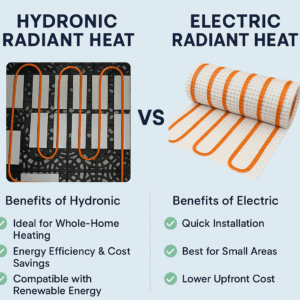Compact Comfort: The Benefits of Radiant Heating for Tiny Homes & Small Spaces
Share this story: Facebook X LinkedIn Email Compact Comfort: The Benefits of Radiant Heating for Tiny Homes & Small Spaces

Hydronic vs. Electric Radiant Heat – Which is Best for Your Home?
When planning a radiant floor heating project, one of the first decisions you’ll face is choosing between hydronic and electric systems. Both types of radiant heat have their strengths, but which is best suited for your home? Let’s break down the differences clearly to help you make an informed choice.
What Is Hydronic Radiant Heating?
Hydronic radiant heating uses warm water circulated through flexible PEX tubing beneath your flooring to gently and efficiently heat your home. Water heated by a boiler or water heater is pumped through these tubes, radiating warmth upward into your space.
Benefits of Hydronic Systems:

What Is Electric Radiant Heating?
Electric radiant heat utilizes electric heating wires or mats installed beneath your flooring. Electricity heats these wires, providing radiant warmth directly beneath your floor covering.
Benefits of Electric Systems:
Which System is Right for Your Home?
How FloorHeat Can Help:
At FloorHeat, we provide comprehensive radiant heating solutions—including both hydronic and electric systems—to meet your specific needs. While we specialize in advanced hydronic solutions ideal for larger or whole-home heating projects, we also offer efficient electric radiant heating systems perfect for smaller spaces, retrofits, and targeted heating applications.
Whether your project calls for the versatility and efficiency of a hydronic system or the simplicity and ease of installation of electric radiant heat, our experts can help you select and design the best solution for your space.
Why FloorHeat?
Ready to get started? Contact us today at floorheatinfo@floorheat.com or call 855-265-5455 to discuss your radiant heating options.
Share this story: Facebook X LinkedIn Email Compact Comfort: The Benefits of Radiant Heating for Tiny Homes & Small Spaces
Share this story: Facebook X LinkedIn Email Join the FloorHeat Contractor Partnership Program – Grow Your Business with Radiant Heating
Share this story: Facebook X LinkedIn Email What Are Heating Zones? In radiant heating, a “zone” refers to a separate
Share this story: Facebook X LinkedIn Email What Is Thermal Mass? Thermal mass refers to a material’s ability to absorb,